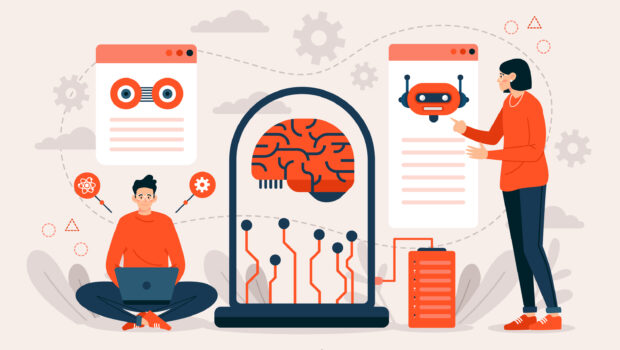How to Use Artificial Intelligence in eCommerce
If we’re trying to name a single trend that’s driving massive conversions in online retailing, artificial intelligence would be the one. It’s the culprit behind Amazon’s successful product recommendations. AI is a broad term that also refers to personalized services, behavioral analytics, and chatbots. That’s why we need to clarify it to online retailers, who don’t want to bother with technical terms. How exactly can they use artificial technology to improve their business?
We’ll focus on actionable tips that you can implement in your business model ASAP.
7 Tips: How to Use AI in Ecommerce
Rely on AI-Assisted Product Recommendations
This is something that online retailers should discuss with their team of designers. Headless eCommerce is one of the most recent trends in software architecture. It separates the frontend (UI) from the backend (business logic) aspect of the website’s design. With that, practical solutions can be implemented without the need for complex backend processes.
Now that we briefly explained what is headless commerce, let’s see: what does it have to do with product recommendations? This type of management system is built to retrieve and explore data that supports your sales strategy. It’s the technology behind so-called hyper-personalization, which leverages and analyzes customer data in real time to suggest solutions that the visitor is most likely to purchase.
AI-assisted product recommendations do require a lot of work on the platform. You need it to support analytics of a huge volume of information. The good news is that once the algorithms are set up, the system will be effective for a long time.
Consider Dynamic Pricing
The prices in online stores are becoming highly flexible. To respond to constantly evolving market demands, businesses rely on dynamic pricing that’s controlled by bots. These are software agents that collect data and adjust the price through algorithms led by business laws.
All retailers understand that the price is affected by competitors’ pricing, level of demand, timing, location, and several other factors. What they cannot do is conduct manual research and adjust the price on the go. Artificial intelligence can do that. By presenting the optimum price for each product to each customer, they increase the chances of conversion.
Use AI to Manage Fake Reviews
A single fake review from a competitor can have detrimental effects to your brand’s reputation. That’s why Amazon has its own system that identifies and sanctions fake reviews. It’s possible for smaller retailers to create something similar.
In 2017, researchers at the University of Chicago developed a machine learning system that identified unusual formatting, writing style, and text patterns typical for fake reviews. Through an internal scoring system, the reviews are being rated and any suspicious ones are flagged. Then, the team can evaluate their authenticity. This type of self-learning setup filters reviews on an ongoing basis.
Tackle Wearable Technology to Generate Sales
By now, all eCommerce platforms are optimized for mobile. The next big question is: is yours optimized for wearables?
Apple Watch, FitBit and similar products are entering the eCommerce market, big time! This is a great opportunity for you to offer personalized recommendations, since wearables collect an impressive volume of data about their owner. For example, the exact location of your potential customer (which wearables detect with GPS technology) enables hyperlocal advertising. You can also modify your search advertising campaign to recognize voice, as that’s how smartwatch users search for products or services.
Enhance Your Platform’s Security
Ecommerce platforms handle a huge volume of sensitive data. Sophisticated cybersecurity is critical for their success and reputation. AI software is effective in identifying new types of threats and malware as they emerge. They are able to quickly detect ransomware or malware attacks and trigger action before they cause damage.
Bots, which aim to cause data fraud through fake accounts, are effectively blocked by AI security systems. They recognize the good bots (such as search engine crawlers), so you don’t need to worry about blocking them.
Use AI to Empower Your Email Marketing Campaign
Ever since paid social media advertising took over marketing strategies, online retailers have put email marketing in the shade. It’s time for that to change. With AI, email marketing campaigns can be more personalized and targeted than ever.
Although the messages are still automated, AI makes them more human and appealing to the recipient’s true interests. Based on the recipient’s response to the messages, the marketing approach can be changed.
The best part is that email marketing becomes more powerful thanks to big data, which can be sourced from social media posts and public records that reveal information about the recipient.
Offer Virtual Personal Shopping Assistants
Personalized recommendations are cool, but you can go one step further by introducing personal shopping assistants to your website visitors. Similarly to a chat bot, the assistant will engage the visitor in a conversation about items, colors, sizes, trends, and everything else that helps them suggest the right products for them. Instead of searching the entire website through categories and keywords, the visitor gets relevant recommendations after a short conversation.
If you don’t have the resources to develop personal shopping assistants just yet, the least you can do is develop a chatbot with recommendation features. Chatbots are cool because they answer questions, solve common issues, and make the website easier to use. When they also offer product recommendations, they elevate the shopping experience and increase customer satisfaction levels.
AI Can Transform Your Online Business
Artificial intelligence isn’t just a tech buzzword that online retailers hear and forget. It’s the force that drives more targeted marketing campaigns, seamless automation, personalized shopping, and increased customer retention. Yes; the above-listed innovations require serious investments and developments. However, tech teams are already trained and experienced in developing AI solutions through headless architecture, so business owners can easily bring their ideas to action.
As an online retailer, you have a serious decision to make: is the AI worth venturing into? It’s important to follow the trends in your industry and see what technology your competitors are using. Your website can greatly benefit from the use of AI, but the possibilities are immense. Do your best to choose the most relevant solutions for your business!
Cover Image by Freepik

















